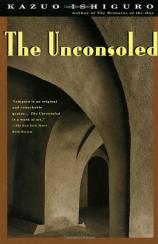About the Book
About the Book
The Unconsoled

The questions, discussion topics, author biography, and bibliography that follow are meant to enhance your group's reading of Kazuo Ishiguro's The Unconsoled. We hope that they will provide you with new ways of looking at- and talking about- this mysterious and infinitely provocative new novel from the Booker Prize-winning author of The Remains of the Day. With superb control and a masterly ear for the accents of repression, Ishiguro has created a work that is both farce and nightmare and that explores the terrible wounds that families inflict on their members and societies on their citizens, the cult of culture, and the straightjacket of celebrity, and dramatizes these themes within the arena of an imaginary city that might be located in today's Germany, in Kafka's haunted Central Europe, or in the maddeningly elastic landscape of our dreams.
Into that city comes Ryder, a musician acclaimed as "the world's finest living pianist...perhaps the very greatest of the century" [p. 11]. He has been summoned to give a performance that may be the most important of his life. But the exact nature of the impending performance eludes him, since Ryder is afflicted with large gaps of memory. He seems to have visited this place before- he soon discovers that he has a wife or mistress here and a little boy who may be his son- but he cannot remember when. He has forgotten the details of the Herculean schedule that his handlers have prepared for him. And he is repeatedly startled by figures from his English past who appear surreally in the town's winding streets, on its trams, and in the houses that Ryder visits on a geometrically increasing series of cryptic and outlandish errands.
Ryder cannot remember what he or these people are doing here, but everyone remembers him. And everyone wants something from him. In the course of the next three days, Ryder is called on to visit childhood friends, peruse albums of clippings, judge musical rehearsals, reconcile estranged families, plead the cause of a disgraced orchestra conductor, and even serve as the guest of honor at the funeral of a total stranger. Behind all these requests is the omnipresent expectation that he somehow restore the morale of a community gripped by a profound despair. It is a despair that is expressed in terms of culture, but that infects the most intimate corners of its victims' lives. For this is a town that idolizes its artists and suffers a collective breakdown when its idols fail.
It is Ryder's crippling defect of character that he can refuse none of the requests that are made of him- except, perhaps, for the ones that truly matter. Even as the pianist desperately tries to meet his "responsibilities"- and to grasp the situation that he is supposed to salvage- it becomes clear that he is both a flawed messiah and a tragically limited human being. With his exaggerated sense of public duty and his stifled, self-deluding voice, Ryder is reminiscent of another Ishiguro character, the butler Stevens who narrates The Remains of the Day. Ryder, too, is at once the beneficiary of a social order and its uncomprehending victim, a man who has sacrificed his life on the altar of a particular kind of service.
And as he did in his earlier novel, Ishiguro here creates a densely populated and fully realized world, at once unrecognizable and familiar, vivid yet soul-sick, from which we come away with an altered awareness of our own.
The Unconsoled
- Publication Date: October 1, 1996
- Genres: Fiction
- Paperback: 535 pages
- Publisher: Vintage
- ISBN-10: 0679735879
- ISBN-13: 9780679735878








